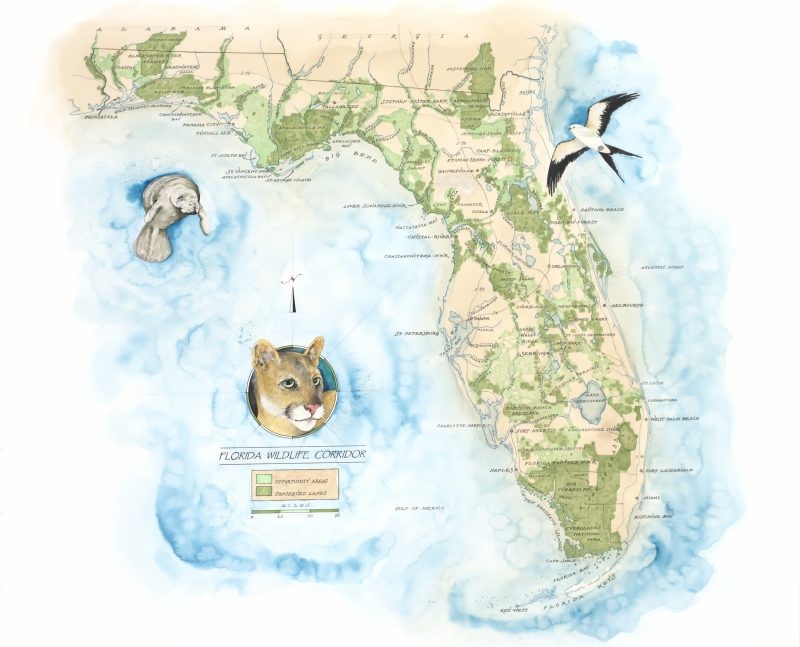
The Florida Wildlife Corridor with conserved areas in dark green and opportunity areas (to be conserved) in light green.
Sponsor
Archbold Biological Station and the Live Wildly Foundation
Award Dates
February 2022 – January 2023
Participants
Project Lead
Graham, Wendy (University of Florida)
Project Participants
Schlatter, Karen (Coordinator, University of Florida)
Braswell, Anna (University of Florida)
Brenner, Mark (University of Florida)
Cohen, Matt (University of Florida)
Deitch, Matt (University of Florida)
Gebremicael, Tesfay (University of Florida)
Shortelle, Ann (Geo2030)
Sukop, Mike (Florida International University)
Goals and Objective
The UF Water Institute is leading an expert panel to assess the water resource benefits associated with the Florida Wildlife Corridor, a conservation initiative to protect and connect wildlife habitats across the state.
The proposed Florida Wildlife Corridor encompasses nearly 17.7 million acres, an area larger than the state of West Virginia. Of that, over half (9.6 million acres) of the area is conservation lands, while the remaining opportunity areas (8.1 million acres) do not yet have conservation status. The current Corridor is based on the Florida Ecological Greenways Network (FEGN) developed by Dr. Tom Hoctor at the UF Center for Landscape Conservation and Planning. The FEGN identifies areas of the state that are critical to a functionally connected network of conservation lands across Florida and has long been used by several state agencies to help prioritize state land acquisitions for recreational trails and conservation lands (e.g., the Office of Greenways and Trails and Florida Department of Environmental Protection’s flagship Florida Forever land acquisition and easement program).
The expert panel will review existing data and science relevant to water resource benefits that may be realized by conserving the Florida Wildlife Corridor. Specifically, they will determine the level of benefit provided by the Corridor for various water resources; assess benefits of a connected versus unconnected landscape; and provide recommendations for maximizing water resource benefits of future additional conservation lands. The panel will produce a final report by the end of 2022. The study is being funded by Archbold Biological Station, a not-for-profit independent research institution in central Florida, through a Bellini Better World Grant.
Available Outputs
Title: Florida Wildlife Corridor Water Benefits Report: An Independent Assessment Led by the University of Florida Water Institute
Authors: Graham, W. D., K. J. Schlatter, A.S. Braswell, M. Brenner, M.J. Cohen, M.J. Deitch, T.G. Gebremicael, A. B. Shortelle, M.C. Sukop

